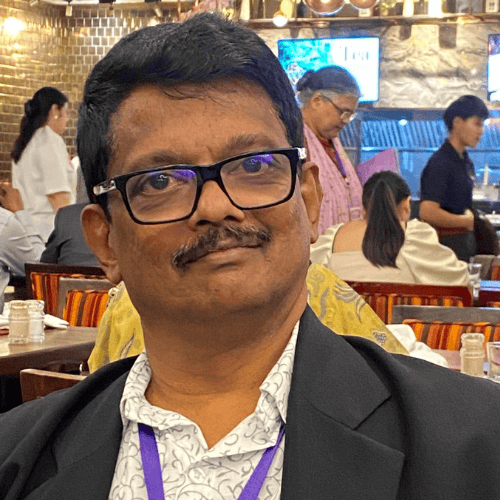
DTP alumnus Dhananjaya Tilakaratne is a veteran Sri Lankan human rights lawyer and activist with over 32 years of experience in defending human rights and promoting social justice.
Currently, Dhananjaya works as the Legal Consultant and Secretary of the Action Network for Migrant Workers (ACTFORM), a national group advocating for the rights of Sri Lankan migrant workers and their families. The network is made of 25 grassroot-level community organisations working across the 18 districts of Sri Lanka. In addition to dealing with migrant workers’ rights, his areas of expertise include fact-finding and documentation of human rights violations, and conducting paralegal training.
In 1992 Dhananjaya joined DTP’s 3rd Annual Regional Human Rights and Peoples’ Diplomacy Program in Sydney, where trainers included DTP’s founders, President José Ramos-Horta and Professor Garth Nettheim. He had recently graduated with a law degree and was working for a Colombo based human rights NGO – in the midst of bitter civil conflicts.
Remarkably, even 32 years later, he still remembers that training and the lasting impression it left on his subsequent career working for human rights.
“DTP’s training was a path-breaking experience for me. It focused on using UN mechanisms to protect and promote human rights, providing participants with tools to engage with treaty bodies, special rapporteurs, and other international frameworks. That is why I still remember so much about that training.”
Reflecting on how this training shaped his career, Dhananjaya added,
“The training offered invaluable exposure to global human rights mechanisms and taught us to engage diplomatically and effectively with international frameworks. It was an immensely valuable capacity-building experience that shaped my focus on the UN system. In 1993, I participated in the Asian Preparatory Committee Meeting for the World Conference on Human Rights in Bangkok and later attended the World Conference on Human Rights in Vienna.”
Since then Dhananjaya’s contributions to human rights have included working with UN High Commissioner for Human Rights (OHCHR) in Sri Lanka and Cambodia, UN-Habitat, and UNOPS and as a consultant with Oxfam in Sri Lanka.
When asked about his current focus on the rights of Sri Lanka’s migrant workers he explained that their rights had been neglected and hidden, especially as abuses often happened in countries of destination in West Asia (Middle East). Women are particularly vulnerable, employed as domestic workers in homes, their labour unprotected by labour laws, and abuses hidden from view. Poverty and promises of better pay are twin drivers of migration. Remittances offer the hope of a better future for their families.
The abuses are less an act of political persecution, than a lack of protection and priority from the government, despite the critical role of migrants to Sri Lanka’s economy. Dhananjaya has been instrumental in advocating for national policies on labour migration, including recruitment regulations, reintegration policies, and recognition of labor rights. advocates for ratifying additional international conventions, such as ILO labour rights, to ensure the fundamental freedoms of all Sri Lankans.
This continues a lifelong commitment to working for a Sri Lanka free from discrimination, where human rights are respected according to constitutional and international norms.
DTP acknowledges the traditional custodians of the land on which we work, the Bedegal people of the Eora Nation. We recognise their lands were never ceded, and we acknowledge their struggles for recognition and rights and pay our respects to the Elders – past, present – and the youth who are working towards a brighter tomorrow. This continent always was and always will be Aboriginal land.
Aboriginal and Torres Strait Islander peoples should be aware that this website contains images or names of people who have passed away.
DTP acknowledges the traditional custodians of the land on which we work, the Bedegal people of the Eora Nation. We recognise their lands were never ceded, and we acknowledge their struggles for recognition and rights and pay our respects to the Elders – past, present – and the youth who are working towards a brighter tomorrow. This continent always was and always will be Aboriginal land.
Aboriginal and Torres Strait Islander peoples should be aware that this website contains images or names of people who have passed away.
Privacy Policy | Terms of Use | Disclaimer | Policies
© 2022 Diplomacy Training Program | ABN 31 003 925 148 | Web Design by Studio Clvr